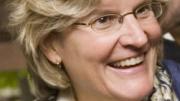A. Clayton Spencer, vice president for policy since 2005, has been elected the eighth president of Bates College, effective July 1. Spencer has worked in Massachusetts Hall for a decade and a half, serving presidents Neil L. Rudenstine, Lawrence H. Summers, Derek Bok, and Drew Faust. She has played a vital role in issues such as the 2004 formulation and expansion of the Harvard Financial Aid Initiative (HFAI), meant to make the College much more affordable to middle-class and upper-middle class families, and to eliminate the family contribution to the cost of attending for many students from lower-income households.
The Bates announcement cited Spencer's record as "an extraordinarily effective and collaborative higher-education leader," both at Harvard and during prior service as chief education counsel in the United States Senate, where she worked for the late Edward M. Kennedy, from 1993 to 1997.
In a message to senior officers, President Faust said of the announcement, "with both joy and some sadness":
Among her many remarkable and enduring accomplishments are her critical contributions to the Harvard-Radcliffe merger, her work creating the Crimson Summer Academy, and her formative efforts in shaping and advancing Harvard’s pathbreaking undergraduate financial aid initiatives. She has managed task forces that have defined important strategic priorities, including the Arts, Common Spaces, and Harvard’s international profile and engagement. Perhaps most significantly, she has been an astute and always forthright advisor to Harvard’s presidents, deans, and governing boards for the last fifteen years, bringing her exceptional intellect, her wisdom, her unfailing sense of humor, and her deep commitment to higher education and its fundamental values to bear on the wide range of issues facing the University.
Clayton staffed the Radcliffe dean’s search that brought me to Harvard, served as interim administrative dean at Radcliffe during the initial months of my tenure, and has worked closely with me on presidential initiatives since I arrived at Mass Hall in 2007. While it is hard for me to imagine Harvard without her, it is also wonderful to anticipate Clayton making what I know will be a distinctive mark as the leader of one of the nation’s most distinguished liberal arts colleges.…[P]lease join me in congratulations and best wishes to Clayton. And please join me as well in congratulations to Bates on its outstanding decision.
Spencer, A.M. ’82, is a graduate of Williams College, where she serves as a trustee, and of Yale Law School. Williams president Adam Falk hailed her "extraordinary record of thinking deeply about important problems and issues in higher education." She was previously a trustee of Phillips Exeter Academy.
Noting her work on education access and affordability, William R. Fitzsimmons, dean of admissions and financial aid for Harvard College, said "Clayton is one of the nation’s and the world's foremost policy experts on higher education.…[S]he played a crucial role in developing and implementing our revolutionary financial-aid program."
In her current role as vice president for policy, Spencer is responsible for developing strategic priorities for Harvard on behalf of the president, directs policy analysis, oversees the office of institutional research, oversees the management of the offices of the president and provost, manages numerous searches for deans and senior administrators, and serves as presidential liaison to the Council of Deans. (She is also a presidentially nominated member of the Harvard Magazine Inc. board of directors.)
Spencer comes from a thoroughly academic family: her father, Samuel Reid Spencer Jr., Ph.D. ’51, was president of Mary Baldwin College from 1957 to 1968 and of Davidson College from 1968 to 1983.









